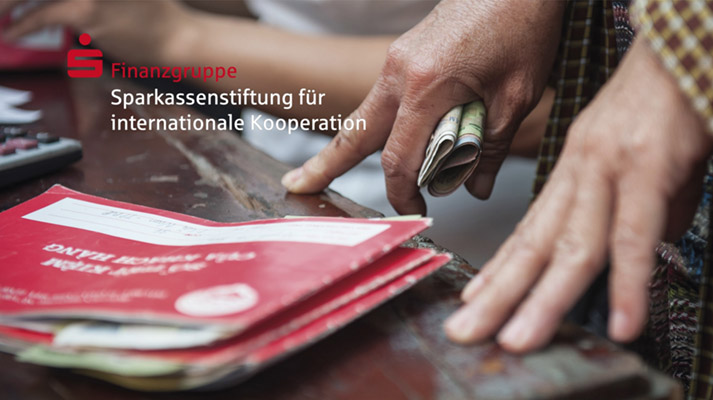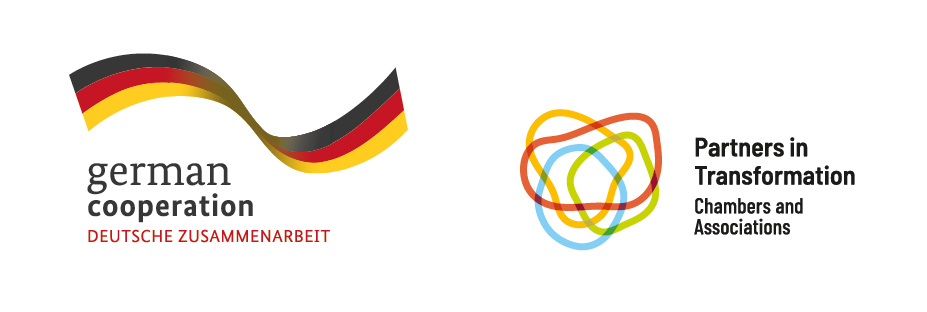Our core topics
German Sparkassenstiftung implements projects across the entire range of banking activities. Its focus, however, is on six thematic priority areas designed to foster financial inclusion: capacity development, financial literacy, green finance, institution building, MSME finance, rural finance.
In the Republic of Moldova, the German Ministry for Economic Cooperation (BMZ) finances the implementation of the project: "Strengthening the sustainable development of rural areas by improving financial access for climate-adaptive measures in the Republic of Moldova"
This is the first time and the only project that explicitly aims to establish and to provide financial products and services to micro and small businesses in agriculture, intended for investments to reduce the negative impacts of climate change.
The project is focussing on:
- Introduction of financial services for micro and small farmers that meet their needs for sustainable and climate-resilient economic development.
- Population groups in rural areas are qualified in the financial field.
- Developing the motivation and ability of rural populations and financial service providers to use or provide financial services for investments in sustainable climate resilience
CCRA & Management
In the last decades, the Republic of Moldova became more vulnerable to climate change. More droughts, late spring frosts, hail, floods and severe storms are affecting agricultural and livestock sectors, thus resulting in economic crisis.
For an efficient implementation of its project in the Republic of Moldova, German Sparkassenstiftung assigned the Dutch company „Climate Risk Services” to assess the risks of climate change in Moldova (as well as in Georgia and Ukraine). As a part of this work, a tool has been developed which can determine climate risk, depending on the location and type of product, for micro and small farmers individually. This tool is an Excel-based computer program meant to be used by financial institutions and the farmers.
This Climate Risks Opportunities and Management (CROM) tool enables the stakeholders to assess their risks and opportunities and preparing for the future, thus mitigating damages and losses.
For the continued development of the CROM tool, German Sparkassenstiftung Moldova cooperates with INCE, and they established a working group to make a even more efficient and easy-to-use program.
This tool will help the agricultural sector to be less vulnerable to climate change.
As an introduction of CROM in Moldova, German Sparkassenstiftung Moldova organized a workshop in which experts from the Dutch company Climate Risk Services gave (online) instructions on how to use the program.
Based on CCRA research, German Sparkassenstiftung Moldova continues to implement its project by focussing towards actuals demands, thus ensuring sustainable assistance towards a better resilience regarding climate change for both micro and small agricultural entrepreneurs as well as financial institutions.
For more information about the CCRA, please contact info.moldova--at--sparkassenstiftung.de.
Financial Literacy
Since the decisions we make in life are often financial ones, it is imperative that we understand how money works. Therefore, German Sparkassen are dedicated to strengthen business skills and to help private households become more financially flexible. With their advisory services, such as the “Sparkassen SchulService” (Savings Banks School Service) for children and young people or the “Geld und Haushalt” (Money and Household) service for adults, they foster financial literacy throughout Germany. The work of German Sparkassenstiftung builds on this experience while adapting the concepts and materials to the specific needs of the project region.
Capacity Building
Training and HR development are integral components of all of projects of German Sparkassenstiftung. From introducing dual vocational training courses to establishing training academies, we take successful concepts and integrate them into our partners’ educational framework in the Republic of Moldova. Besides training local trainers to implement our specially devised business simulations, we also organize and conduct seminars.
Business Games
Offering a risk-free environment in which interaction, practical exercise combined with knowledge transfer lead to the high learning success of the Business Games made by German
Sparkassenstiftung for International Cooperation (DSIK) in collaboration with BTS. The Business Games, developed with funds from the German Federal Ministry for Economic Cooperation and Development (BMZ), support local capacity building by breaking down complex financial and entrepreneurial concepts using a playful environment which is tailored to the needs and financial literacy levels of the target groups.
The Business Games are designed to target employees of financial institutions, entrepreneurs, farmers, youth, and groups that are underserved by financial markets, including women, and minorities, among others.
Since their beginnings in the 1990s, the Business Games have become an international brand for an innovative and interactive learning experience. A constantly rising demand for and ample experience in training in many countries around the world as well as highly satisfied participants are convincing proof of the success and the added value of the Business Games.
Overall, more than 2,200 trainings with more than 50,000 participants were conducted in over 30 countries with outstanding results and participant’s satisfaction.
The combination of teamwork and peer learning within the group as well as the reflection and competition between the individual participants stand for a dynamic and highly engaging learning experience.
For more information about our Business Games, visit the website of our Headoffice in Bonn.
Technical Analysis
German Sparkassenstiftung contracted the marketing research company Magenta Consulting to conduct a study among agricultural entrepreneurs. The study evaluates the financial and business literacy skills as well as training and advisory support needs of small farmers and MSE entrepreneurs in agriculture and food processing businesses rural areas of Moldova.
Magenta Consulting conducted interviews throughout governmental institutions, financial institution, business service providers, business associations, and rural extension services to understand their perspective on the development of the SME sector and the evolution of agricultural business in Moldova.
The study assessed the general economic and financial situation of the target group, as well as the impact of the Covid-19 outbreak. The data presented in this report was collected through a mixed methodology, which combined qualitative and quantitative research:
- Qualitative research. At this stage, 20 in-depth interviews were conducted with governmental institutions, financial instutions, business service providers, business associations and rural extension services of the stakeholders;
- 4 Focus Groups (FGs) with Micro and Small Farmers and Enterprises were established.The qualitative data was collected during the period between 06.04.21 and 06.05.21.
- A survey was conducted in which 402 respondents participated. Respondents were surveyed in case they fulfilled all of the following criteria:
- Micro and Small farmers or MSE entrepreneurs along the agricultural value chains.
- The respondents are owners or co-owners of a business and are involved in its day-to-day management.
- The business is located in a rural area;
- The business has been running in the last year. Data was collected between 06.04.21 and 06.05.21.
Partners & Stakeholders
German Sparkassenstiftung Moldova aims to raise the awareness of climate change risks on Micro and Small Enterprises (MSE) in agriculture and the financial institutions (FIs) of the Republic of Moldova. A smart assessment of the risks leads to more efficient management of the existing resources. Therefore, an in-depth understanding of the situation is a good basis for new financial products focusing on demand. To achieve these goals, we are cooperating with local organizations and institutions that represent the interest of our target group – Micro and Small enterprises. Simultaneously, we cooperate with financial institutions, banks, and non-banks, who include MSE as their target groups in their portfolios.



